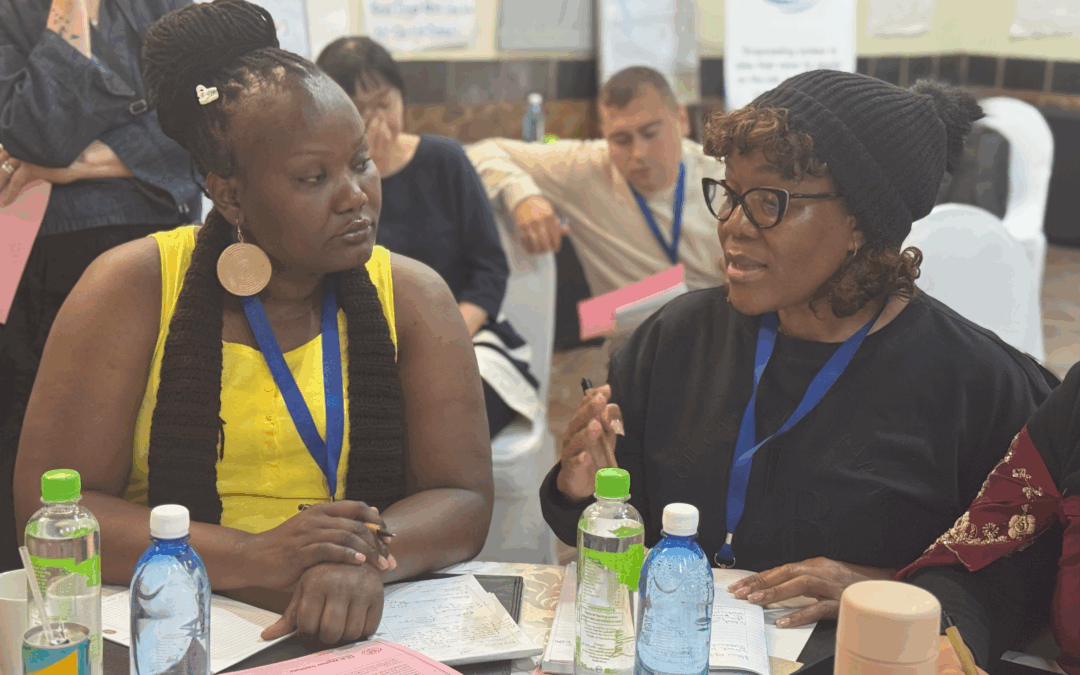
Aug 27, 2025
Nineteen union leaders and labor rights defenders working to advance democracy in communities around the world convened in South Africa in June as part of the Global Labor Leadership Initiative (GLLI), a multi-year Solidarity Center partnership with Cornell ILR. The GLLI connects union leaders worldwide to share strategies and build stronger movements. By defending rights, winning safer workplaces and lifting new voices into leadership, they show how democracy grows when workers have the power to shape change.
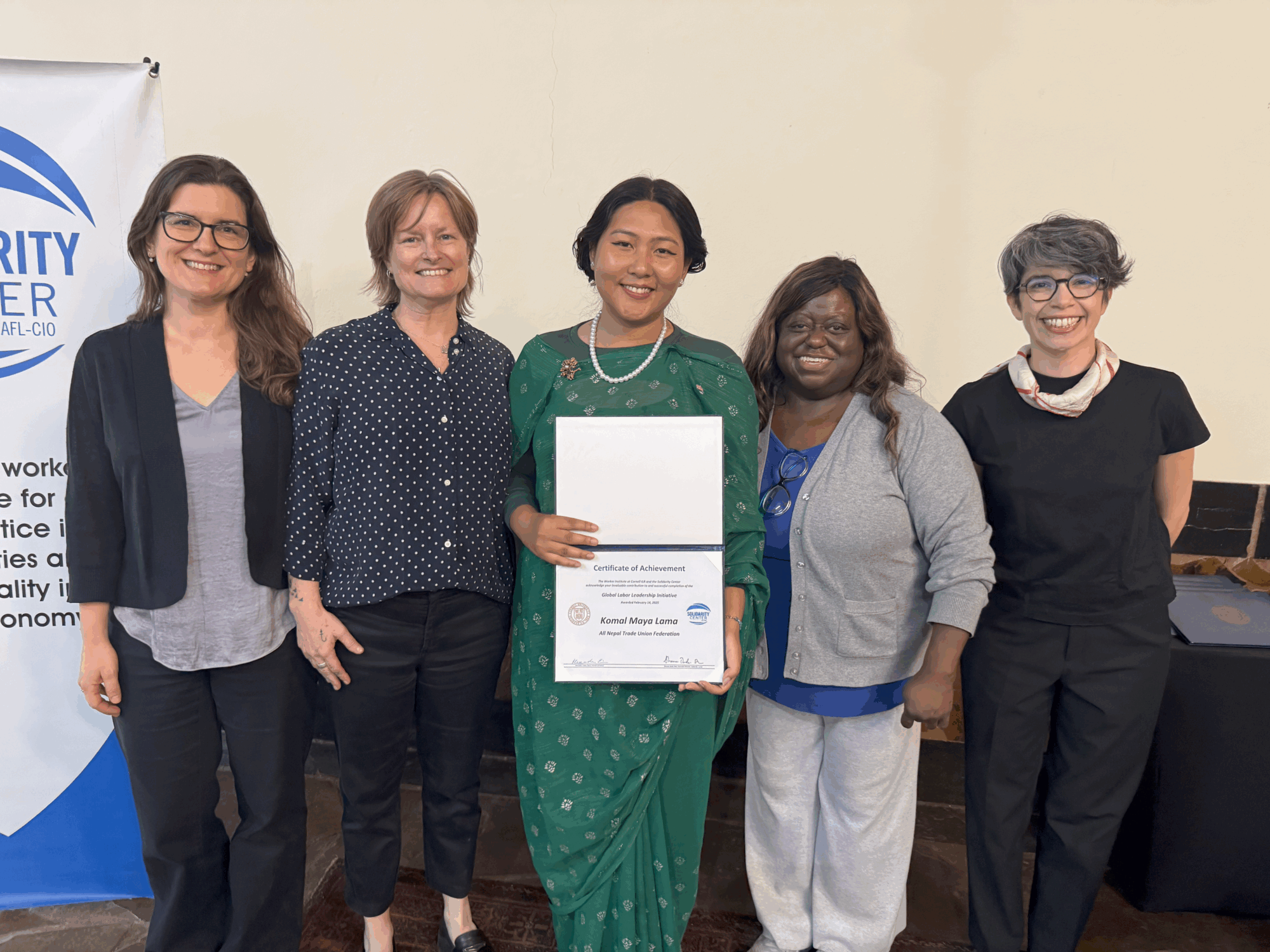
“It feels like I am not alone in this journey,” said All Nepal Health Volunteer Workers’ Union (ANHVWU) President and GLLI participant Komal Maya Lama, who accepted a completion certificate from Solidarity Center and Cornell ILR Worker Institute GLLI facilitators. Photo: Connie Mabin
“It’s amazing to know about the people all over the globe,” said young worker Komal Maya Lama, All Nepal Health Volunteer Workers’ Union (ANHVWU) president and 2025 GLLI participant. “It feels like I am not alone in this journey. I have built a beautiful bond and learned so many things from those leaders.”
Annually, the GLLI provides participants with solidarity and skills-building opportunities so they can help build a dynamic, powerful and inclusive labor movement to transform society and the economy so that it works for workers.
This year, GLLI participants from Kenya, Lesotho, Liberia, the Maldives, Nepal, Nigeria, the Philippines, Serbia, Sierra Leone, South Africa and Taiwan met near Johannesburg from June 22-27 where they shared strategies to tackle in-country and mutual challenges affecting working people, often in the face of brutal conditions, and worked to strengthen global movement building.
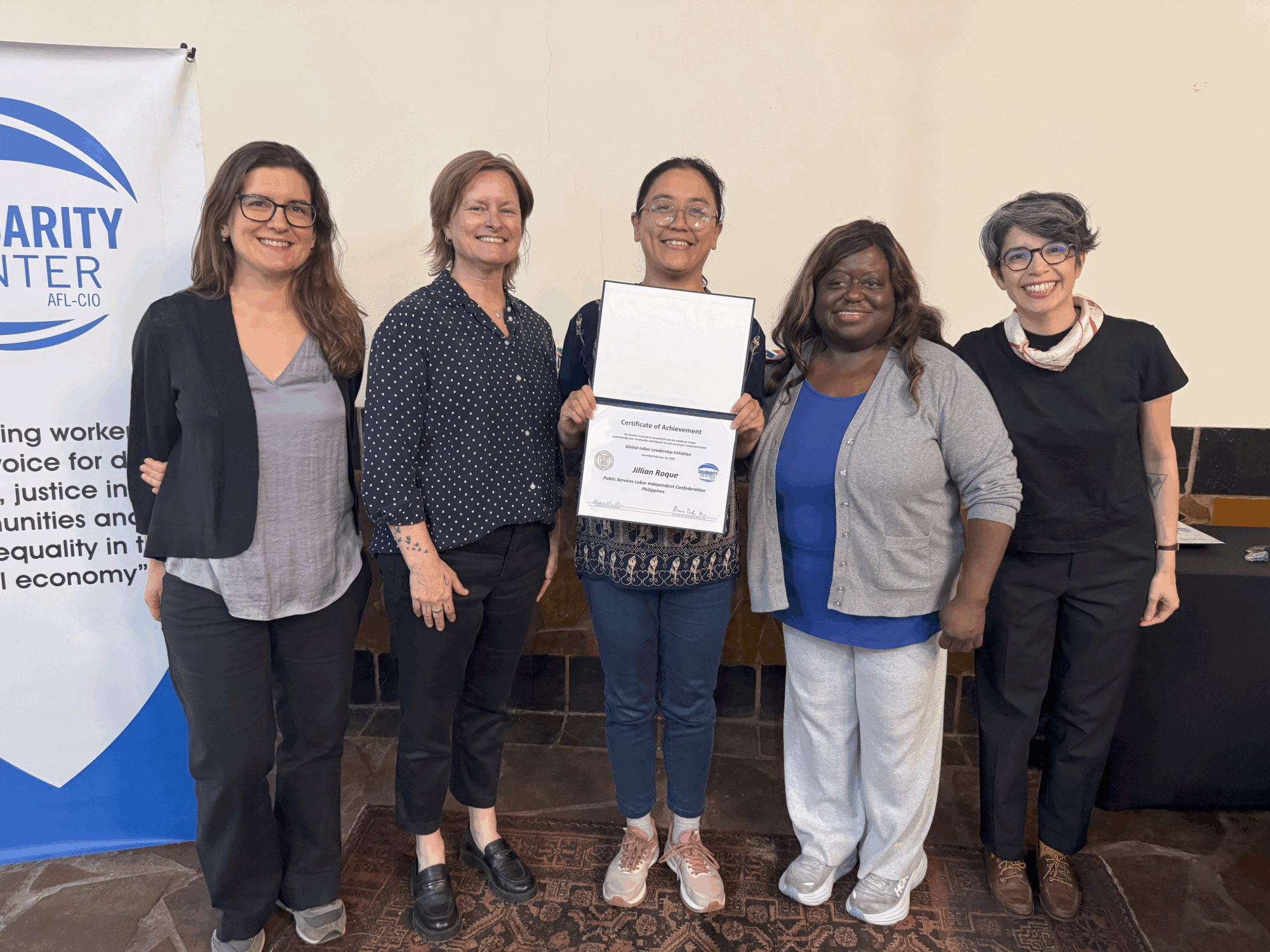
“I’ve gained tools I can use to make my leadership more effective,” said Philippines Public Service Labor Independent Confederation (PSLINK) Deputy General Secretary and Chief of Staff Jillian Roque, who accepted a completion certificate from Solidarity Center and Cornell ILR Worker Institute GLLI workshop facilitators. Photo: Connie Mabin
“I’ve gained a lot of very practical things: tools I can use to make my leadership more effective, more strategic, more intentional–the very things we need to really make changes on the ground,” said Jillian Roque, deputy general secretary and chief of staff of the Philippines Public Service Labor Independent Confederation (PSLINK).
Democracy depends on working people and their organizations to keep it resilient, said 2025 GLLI participants, who discussed unions’ unique role and capacity to push back on unjust and undemocratic forces. Building on a 2024 retreat in Sri Lanka that focused on individual leadership assessment and development, the South Africa retreat broadened the lens to thinking about how unions can bolster their organizations and strategies across social movements. They shared approaches for defending and promoting worker rights in the face of an ever-growing assault across the globe on working people.
“Trade unions have the best position to get people really together,” said a GLLI participant who is an independent labor activist.
“Connecting with people doesn’t mean that you put people on social media and attract their attention; it is really about how you can interact with them. Trade unions are so crucial to the democratic movement for discussing issues and hearing people’s voices: To get people really together,” he said.
Worker rights are in free fall across every continent, leading the ITUC to warn this year against a “billionaire coup against democracy that now threatens democracy itself.” According to the 2025 International Trade Union Confederation (ITUC) Global Rights Index, workers’ access to justice was restricted in 72 percent of countries during the reporting period, representing the worst level ever recorded.
As the largest democratic movement in the world, unions are uniquely placed to defend and expand democracy, not only through elections but in the workplace, in communities, and national and global institutions. Where independent unions provide individuals with the opportunity to elect and be leaders, and join in common cause for better wages, benefits and working hours, and where organized labor holds politicians accountable, democracy thrives.
“Unions are a school for teaching people how to organize and fight for their dignity and rights and how people get others to join them. That’s why we’ve seen unions on the forefront in defending democracy in Belarus, in Zimbabwe and eSwatini, in Hong Kong and in Tunisia,” said Solidarity Center Executive Director Shawna Bader-Blau at last year’s GLLI convening, in Washington, D.C..
Unions benefiting from their leaderships’ participation in the 2025 GLLI in South Africa included:
- Kenya’s Amalgamated Union of Kenya Metal Workers (AUKMW)
- Kenya Medical Practitioners Pharmacists and Dentists Union (KMPDU)
- Lesotho Public Employees Union (LEPEU)
- Liberia’s United Workers Union of Liberia (UWUL)
- Maldives Health Professional Union (MTUC)
- Nepal’s All Nepal Health Volunteer Workers’ Union (ANHVWU)
- Nepal’s General Federation of Nepalese Trade Unions (GEFONT)
- Nepal Trade Union Congress (NTUC)
- Nigeria’s Federation of Informal Sector Workers of Nigeria (FIWON)
- Philippines’ Associated Labor Union (ALU)
- Philippines’ Public Service Labor Independent Confederation (PSLINK)
- Serbia’s trade union confederation Nezavisnost
- Sierra Leone Domestic Workers Union (SLeDoWU)
- South Africa’s National Education, Health and Allied Workers’ Union (NEHAWU)
- South Africa’s Federation of Unions of South Africa (FEDUSA)
- Taiwan Domestic Caretakers Union (DCU)
Aug 7, 2025
In a landmark development, the Inter-American Court of Human Rights has affirmed for the first time that the right to care is an autonomous human right under the American Convention on Human Rights.
In its Advisory Opinion OC-31/25, the Court ruled that caregiving, whether paid or unpaid, is essential to human dignity and must be legally recognized and protected. Requested by the Argentine Republic, the opinion outlines how governments across the Americas must safeguard the rights of people who provide care and those who depend on it.
“We are very pleased that the Court emphasized that caregiving, both paid and unpaid, must be recognized as a form of work that requires legal and social protection,” said Jeffrey Vogt, director of the Solidarity Center’s International Lawyers Assisting Workers (ILAW) Network. “It also importantly stressed that caregiving plays a vital role in ensuring human dignity and the functioning of society.”
The ILAW Network, alongside the International Trade Union Confederation (ITUC), played a key role in securing this legal victory, submitting an amicus brief urging the Court to affirm care work as deserving of full labor protections. Co-authored by ILAW members Cynthia Benzion, María Paula Lozano and Alejandra Trujillo, the brief reflects years of Solidarity Center commitment to advancing care workers’ rights.
“The moment you go to work, we are there taking care of your home and taking care of your children. Our work makes it possible for you to do your work. Society must recognize the value of domestic workers,” said Chirlene Dos Santos Brito, the Secretary of Trade Union Training at Brazil’s National Federation of Domestic Workers (FENATRAD).
What the Court Ruled
The Court’s opinion sets out a clear framework for state responsibilities under international human rights law:
- States must adopt policies ensuring fair and equitable working conditions for paid care workers, including recognition of their labour rights. The Court underscored the importance of freedom of association and the right to bargain collectively in this context.
- Unpaid care work, disproportionately borne by women, must be addressed through comprehensive care systems, parental leave, flexible work policies, and access to social security.
- Those who provide unpaid care must be protected against exclusion from social protection systems and should have access to maternity and paternity benefits, pensions and contributory support.
- States should progressively ensure that workers with family responsibilities can exercise their right to work without discrimination, for which they should implement measures to reconcile work and care responsibilities and remove barriers that prevent care responsibilities from allowing them to access or remain in employment
- States must adopt differentiated strategies to protect the rights of vulnerable groups involved in care work, including migrant domestic workers, who can be trapped in exploitative working conditions, including forced labor.
A Democratic Imperative
This ruling reflects a more profound truth: when workers join together to defend their rights—whether in a workplace, a community, or before the highest courts—they shape the laws and policies that affect everyone. Recognizing care as a human right affirms that those who provide care, paid or unpaid, have the power to influence decisions that make life better not just for themselves, but for society as a whole. That is the foundation of a healthy democracy.
“This opinion sets a new standard in the Inter-American System by anchoring care within the human rights framework,” said Lozano. “It reinforces states’ duties to advance justice and build more inclusive economies.”
From Law to Action
This milestone builds on years of collaboration across Solidarity Center teams and with partners throughout Latin America and the Caribbean. “The decision creates new momentum for unions, civil society, and grassroots advocates to secure legal and policy reforms, from improved labor standards to publicly supported care systems, added Trujillo. “Now the real work begins to ensure these rights are realized in practice.”
The Solidarity Center will continue working alongside allies to transform this legal precedent into meaningful change for working people—and in doing so, to strengthen the foundations of democratic societies.
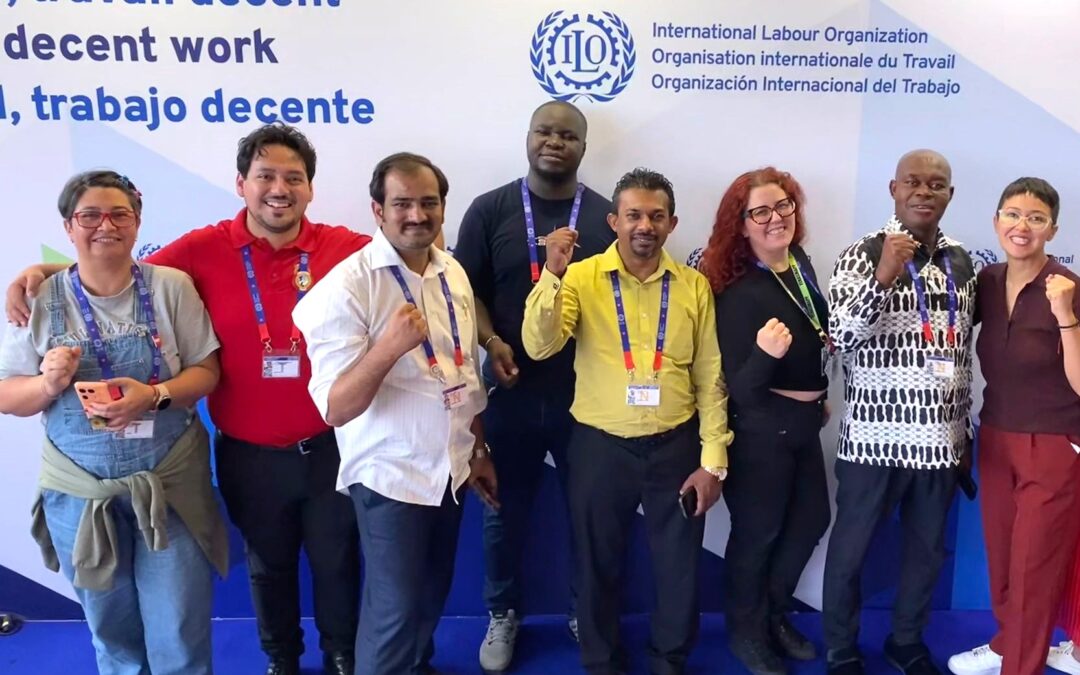
Jul 30, 2025
At the 2025 International Labor Conference (ILC), which took place June 2-14, the Solidarity Center and its partners showcased what happens when workers join together: they speak up and fight for better jobs—and a better world.
The ILC, the annual meeting of the International Labor Organization (ILO), brings together worker, employer and government representatives to debate policy, make decisions and negotiate new international labor standards to promote decent work.
As a result of our unique partnerships with working people and unions from around the world, workers assumed an active role throughout the ILC conference, building on our guiding principle that if working people have the freedom to organize and bargain, they will build more just, inclusive and democratic societies.
With Solidarity Center, Platform Workers Shape a Global Treaty
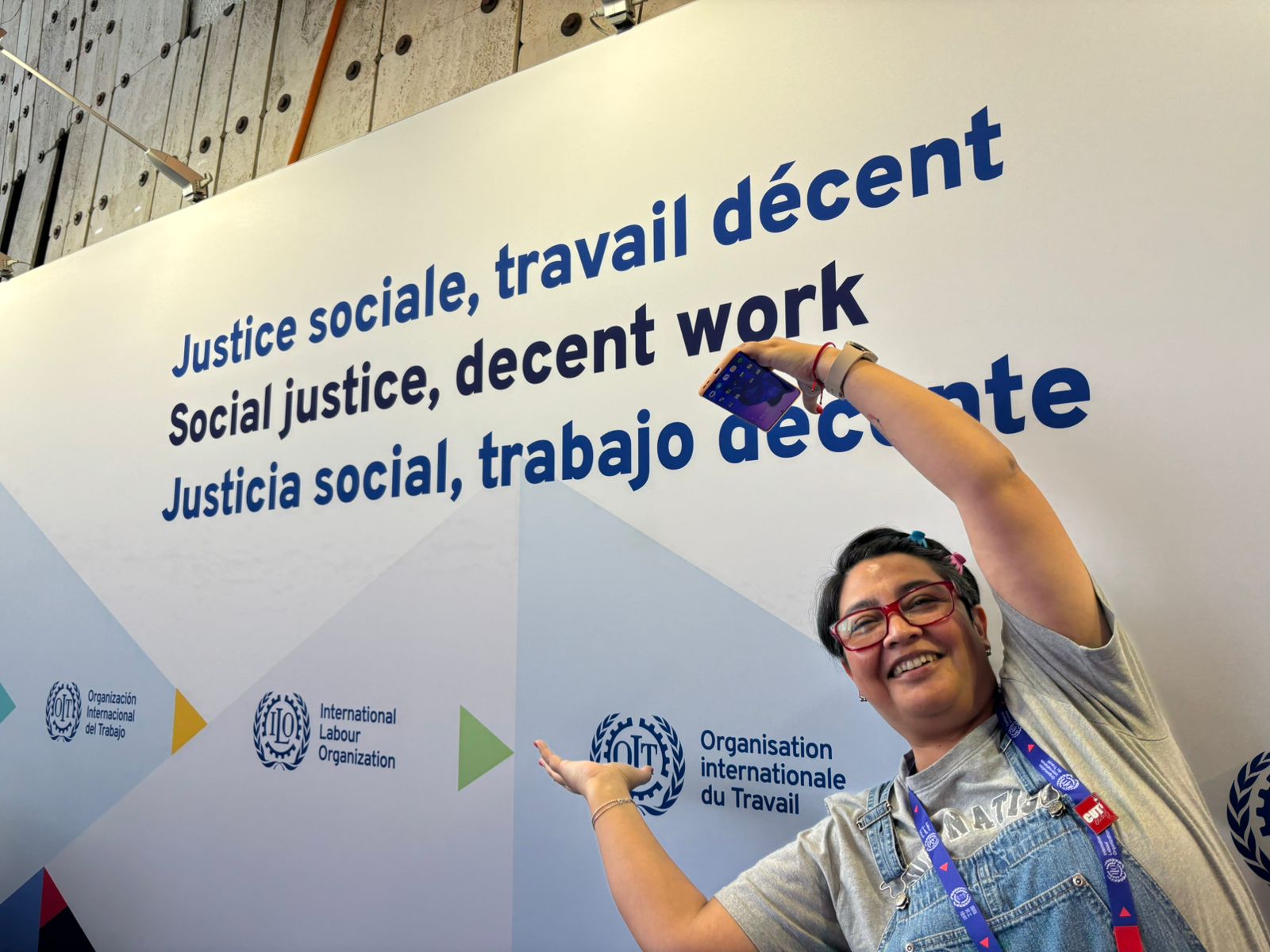
In Chile, Solidarity Center delegate Angelica Salgado Delgadillo heads the Cornershop Union of Uber and serves as a national councilor in the Central Unitaria de Trabajadoras y Trabajadores (CUT). Credit: Solidarity Center
Between 154 million and 435 million workers have online jobs around the world. While platform work is associated with ride hailing and delivery, a broad range of digital platform work is now happening through apps and websites.
A new ILAW Network publication, Taken for a Ride 3 – Lost in a Crowd: How Crowdworkers Are Denied Their Rights at Work, looks at how content moderators, software programmers and other digital platform workers engage in data-related tasks and yet receive no basic workplace rights.
Following years of research and advocacy for the development of a global treaty promoting decent work for app-based workers, led in part by the Solidarity Center’s ILAW Network, the ILO began the process to negotiate a first-ever Convention establishing decent work for platform workers worldwide. (Conventions are legally binding international treaties that may be ratified by member countries.)
“The Solidarity Center Rule of Law team participated actively in the negotiation for a new standard addressing decent work on digital labor platforms, while the Solidarity Center’s Organizing Department coordinated with national platform workers unions to facilitate their participation in the work of the committee,” said Jeffrey Vogt, Solidarity Center Rule of Law director, who also leads the Center’s International Lawyers Assisting Workers (ILAW) Network.
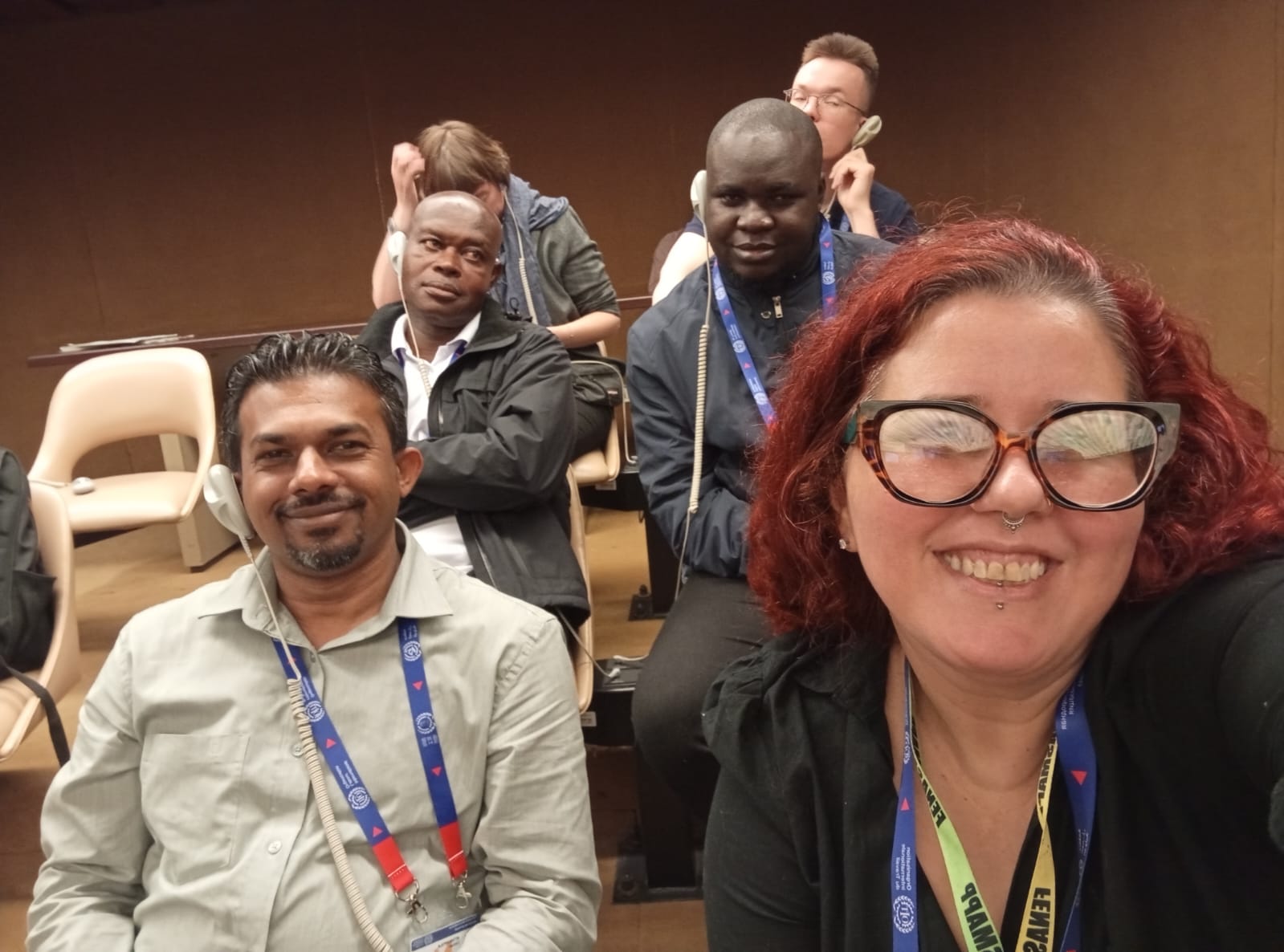
Worker delegates connected with their governments to win support and improvements in an international treaty on the rights of platform workers. Front from left: Charith Attanapola, Sri Lanka; Carina Trindade, Brazil. Rear from left: Philip Aryeh, Ghana; Mophat Okinyi, Kenya. Credit: Solidarity Center
To develop a Convention, workers, employers and government members meet in Geneva to debate and draft its content, and the June conference was the first of two such meetings. Together with digital app-based workers from seven countries, Brazil, Chile, Ghana, Kenya, India, Mexico and Sri Lanka, the Solidarity Center efforts were key to ensuring the proposed Convention and its Recommendations represented workers’ real-life experiences and concerns.
Months before the June ILC met to consider Convention proposals, Solidarity Center worked closely with the platform worker delegates, ensuring they were part of every step—contributing to the ILC’s multiple draft reports, advocating with lawmakers and engaging in training to hone their messages.
“By bringing together workers from multiple regions, the ILC served as a powerful space for South-South exchange,” said Kruskaya Hidalgo Cordero, Solidarity Center field organizing specialist. “Delegates strengthened trust, shared strategies and discussed common challenges such as ensuring labor standards cover digital platform workers.”
Building Worker Power, Democracy
With input into creating the latest draft, the involvement of the Solidarity Center conference delegates was key in discussions and in developing the most recent outline.
Closely coordinating with their unions at the conference, worker delegates provided feedback and recommendations to their government represetatives—who in turn often took supportive positions, raising key points during negotiations and in some cases, adjusting their votes.
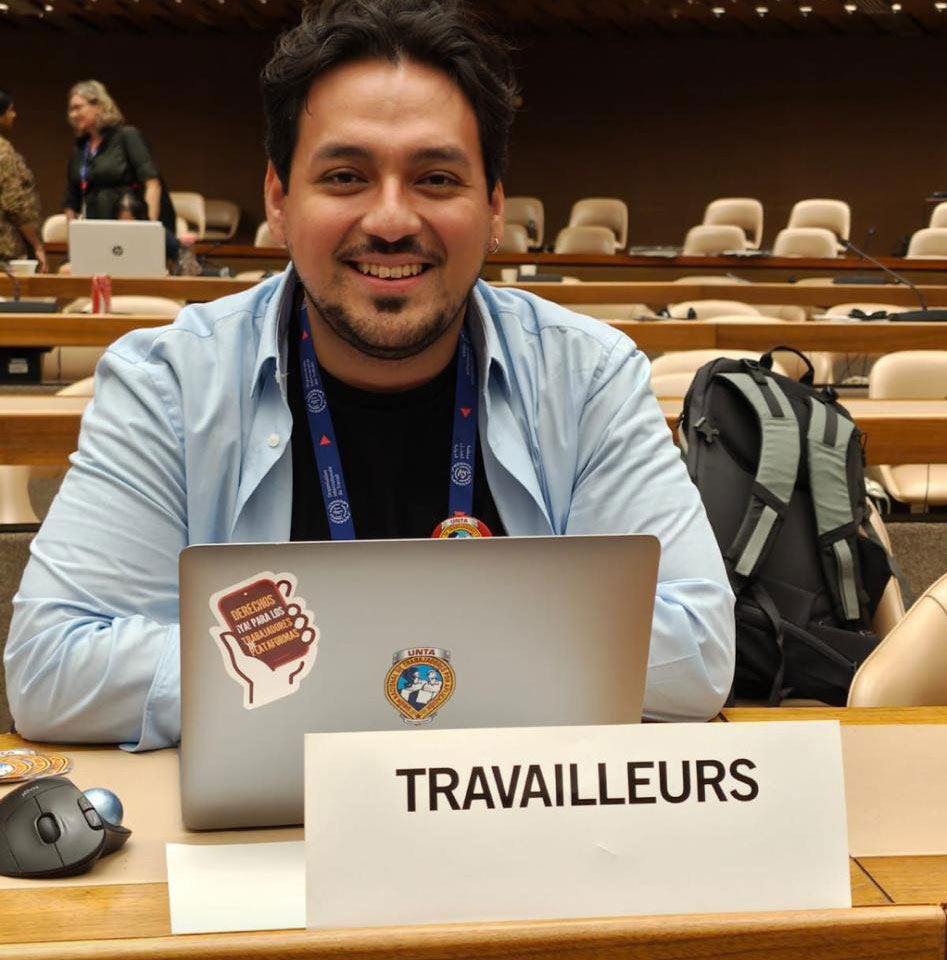
Sergio Guerrero from Mexico was among seven platform workers collaborating with the Solidarity Center to ensure decent work in the gig economy. Credit: Solidarity Center
The result, “Decent Work in the Platform Economy,” was a commitment to a Convention and Recommendation at the end of the process, as well as negotiated definitions and some initial language on the rights of workers to obtain information on automated systems. The platform workers will continue to hone and refine drafts throughout the year, with a final Convention and Recommendation likely adopted at the next ILC in June 2026.
Through ILC participation, the Solidarity Center enabled strong worker power—and worker democracy. Going forward, as part of the Organizing Department’s global platform and broader strategy on platform work, Solidarity Center will create a dedicated space for cross-regional collaboration. Digital app-based workers will take part in a series of virtual exchanges where they will share organizing strategies—strengthening bonds and coordination across regions.
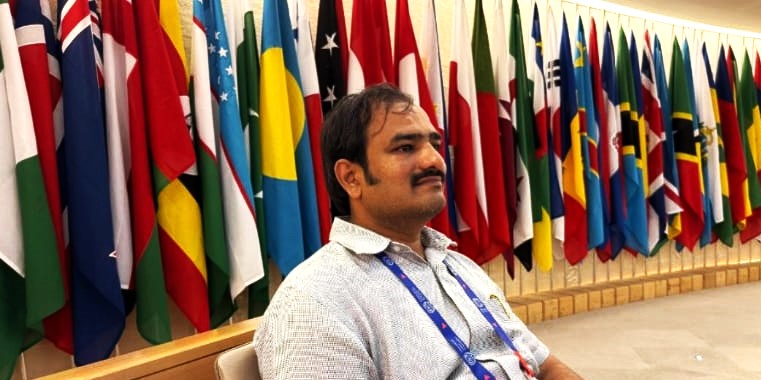
Digital app-based driver, Shaik Salauddin from India, part of the Solidarity Center delegation, frequently reaches out in social media through his union. Credit: Solidarity Center
Creating international connections at the ILC, where digital app-based workers initiated relationships with key global allies , expands connections not only for their organizing networks but also embeds platform worker issues more firmly within global union agendas.
“These interactions deepened the foundation for a worker-led international network capable of sustained collaboration beyond ILC spaces,” said Hidalgo Cordero.
Including Workers’ Voice
To ensure that workers are in the conversations around the informal economy, one Solidarity Center strategy included collaboration with Saida Ouaid, a member of the Democratic Confederation of Labor (CDT) in Morocco.
Ouaid represents agricultural workers, who are among the two billion people globally supporting themselves and their families in the informal economy—including street vendors, domestic workers and tuk-tuk drivers. These workers are not covered by “formal” economy protections, such as job safety and health or health care.
Ouaid actively participated in the ILC general discussion Addressing Informality and Promoting the Transition to Formality for Decent Work to reflect on progress made since the adoption of ILO Recommendation 204 and what else is needed to advance the transition to formality, in recognition that informality remains high.
“Being present gave me the opportunity to voice my organization’s position, which is the urgent need to improve the conditions of informal economy workers and to integrate them into a formal economy that meets the standards of decent work and dignified living,” she said.
The Solidarity Center also provided materials to union partners who sought to participate in the ILC discussions, including several from around Africa. And, the Solidarity Center coordinated positions and priorities with the International Domestic Workers Federation (IDWF), UNI Global and Women in Informal Employment Globalizing & Organizing (WIEGO), key to its efforts to build long-term alliances with global unions and other allies.
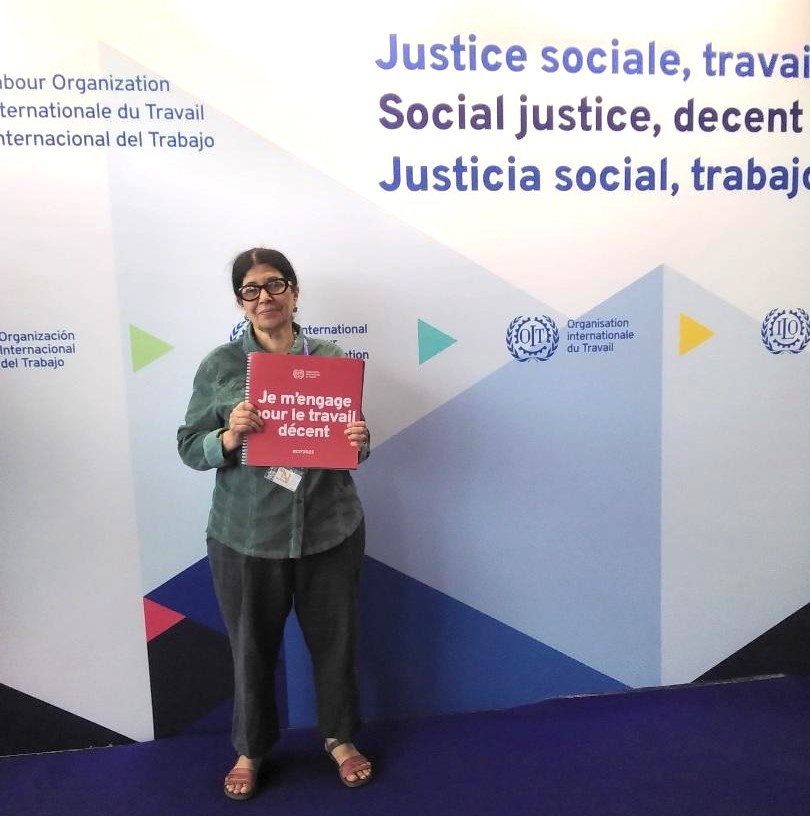
Solidarity Center delegate Saida Ouaid, a member of the Democratic Confederation of Labor in Morocco, pushed to improve conditions for 2 billion workers such as those in agriculture and street vending who are in the informal economy. Courtesy Saida Ouaid
Because working people and their union representative such as Ouaid were a key part of the discussions, they pushed back employer attempts to restrict union membership and collective bargaining to formal workers in accordance with national laws. Ultimately, the final document represents the success of working people in upholding the freedom to form unions and the right to collectively bargain as a right for “all workers” as essential for transitioning to inclusion in fundamental labor rights.
Including workers’ democratic freedom to form unions and bargain together recognizes the Solidarity Center’s core principle that unions are the democratic institutions of the working class that allow working people to stand together, speak up and bargain not only for better jobs, but for a better world.
“Attending this session was a rich and meaningful experience, through the contributions, testimonies and shared experiences of trade unions, during both the Workers’ Group meetings and the general sessions,” said Ouaid.
Workers’ Succeeded in Adding Key Rights
Working in agriculture, as a street vendor or in other jobs in the informal economy increases people’s vulnerability that typically cannot be addressed by a country’s basic labor protections. Workers at the conference were key to the adoption of new language on the necessity of employer and government accountability and creates an environment for transitioning to jobs in the formal economy that lead to worker protections.
Workers’ involvement also shaped the outcomes document so that it represents their lived experiences and the necessity for safe working conditions, by
- Acknowledging the importance of a safe and healthy working environment to decent work and
- Recognizing the role that trafficking, exploitation, stigmatization and harassment in hindering formalization efforts.
“There were a number of important provisions proposed by the workers’ group that were able to ensure the rights of informal economy workers in the final outcomes,” said Erin Radford, senior specialist in Solidarity Center’s Global Worker Empowerment Department.
“In other cases, the workers’ group was successful in eliminating harmful amendments proposed by the employers’ group or governments or in reducing the harm of the amendments. In particular, it was important to ensure nothing in these outcomes would undermine or weaken the 2015 document.”
See all the texts adopted in the June 2025 conference: Texts adopted by the International Labor Conference at its 113th Session.

Jul 21, 2025
Funding by the National Endowment for Democracy (NED) has enabled the Solidarity Center to provide workers around the globe with the tools they need to achieve decent wages and safe working conditions by strengthening their ability to engage in such democratic practices as the ability to freely speak out, form unions and associations and shape the futures for them and their communities.
Through NED’s high-impact democracy investments, the Solidarity Center is bringing about its core belief that when working people have the freedom and tools to join together in unions and associations, bargain with employers and steer their own course, they will build more just, inclusive and democratic societies.
As part of NED’s founding in 1983 as a bipartisan, nonprofit foundation, Solidarity Center has transformed millions of lives in dozens of countries:
- Enabling working people to improve access to health care in Nigeria, where the government provided nearly $70 million to bolster the country’s health infrastructure following a Solidarity Center effort advocating increased public spending on health care and boosting health care workers’ wages and working conditions;
- Building power with more than 1,000 workers cutting and harvesting sugar cane in the Dominican Republic to secure decent wages and living conditions and safety at work by exercising their democratic freedoms;
- Improving health and safety at more than 1,000 worksites in Serbia through training and support, which also enabled workers to collaborate with the government and the Serbian Association of Employers to address safety and workplace health hazards.
- In Thailand, where NED funding has enabled Solidarity Center to improve conditions for workers making garments and electronics in supply chain factories, Solidarity Center efforts assist workers in their efforts to collect unpaid wages, such as at the Brilliant Alliance Thailand (BAT).
“With the support of Solidarity Center, which negotiated directly with the multinational company (the customer of BAT), 1,250 workers won back $8.3 million in wages and severance payments owed to us,” said former garment worker, Teuanjai Waengkham.
The Philippines, Central Asia, Morocco and the Maldives provide more glimpses into NED-supported Solidarity Center efforts to strengthen a new generation of advocates for workers’ fundamental rights, and improve wages and job safety that often expand to nonunion workers and entire communities.
Fair Wages in the Philippines
Across the Philippines, workers are frequently not paid what they are owed. Bolstered by the Solidarity Center, many are now exercising their democratic rights to advocate for—and receive—fair pay.
Funded by NED, Solidarity Center efforts led to a recent ruling granting 7.2 million PHP ($128,000) in lost wages for digital platform drivers for FoodPanda in Cebu. As they joined together in their new union, RIDERS-SENTRO, the drivers could connect with local governments to press their concerns and make their voices heard in a fragile democracy.
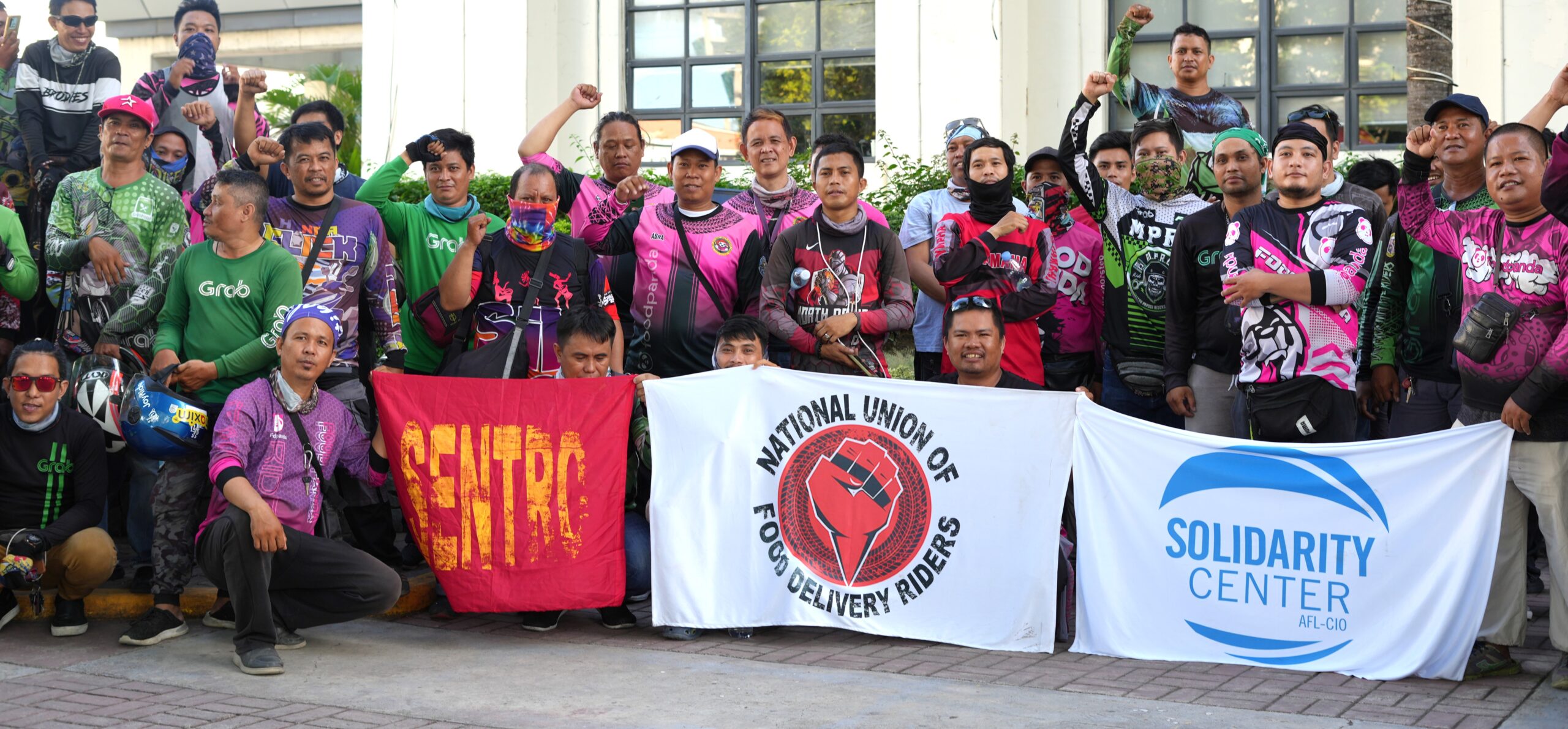
Food delivery riders improved pay at FoodPanda in Cebu, Philippines, part of platform workers’ efforts to assert their rights, protect their lives and improve working conditions.
across the globe.
FoodPanda is appealing the ruling, but the drivers say that with a union, they are confident of their ability to win their rights on the job. When working people have the freedom and tools to organize, bargain and lead, they will build more just, inclusive, and democratic societies.
“Because of the union, we have the fighting spirit for this,” says Abraham Monticalbo, Jr., a RIDERS-SENTRO member. Delivery drivers empowered to achieve decent wages boost their living conditions—and that of their family.
“We realize our power, our rights.”
Forging a New Generation of Workers in Central Asia
Many young people finish school or college and start jobs without knowing their legal rights at work, or how to identify workplace practices that reflect corruption.
In Central Asia, where the Solidarity Center hosts a Regional Youth School, multi-day workshops raise awareness about workplace violations, while empowering young people, as key agents of change, to stand up for worker rights, challenge corruption and take initiative in their communities.
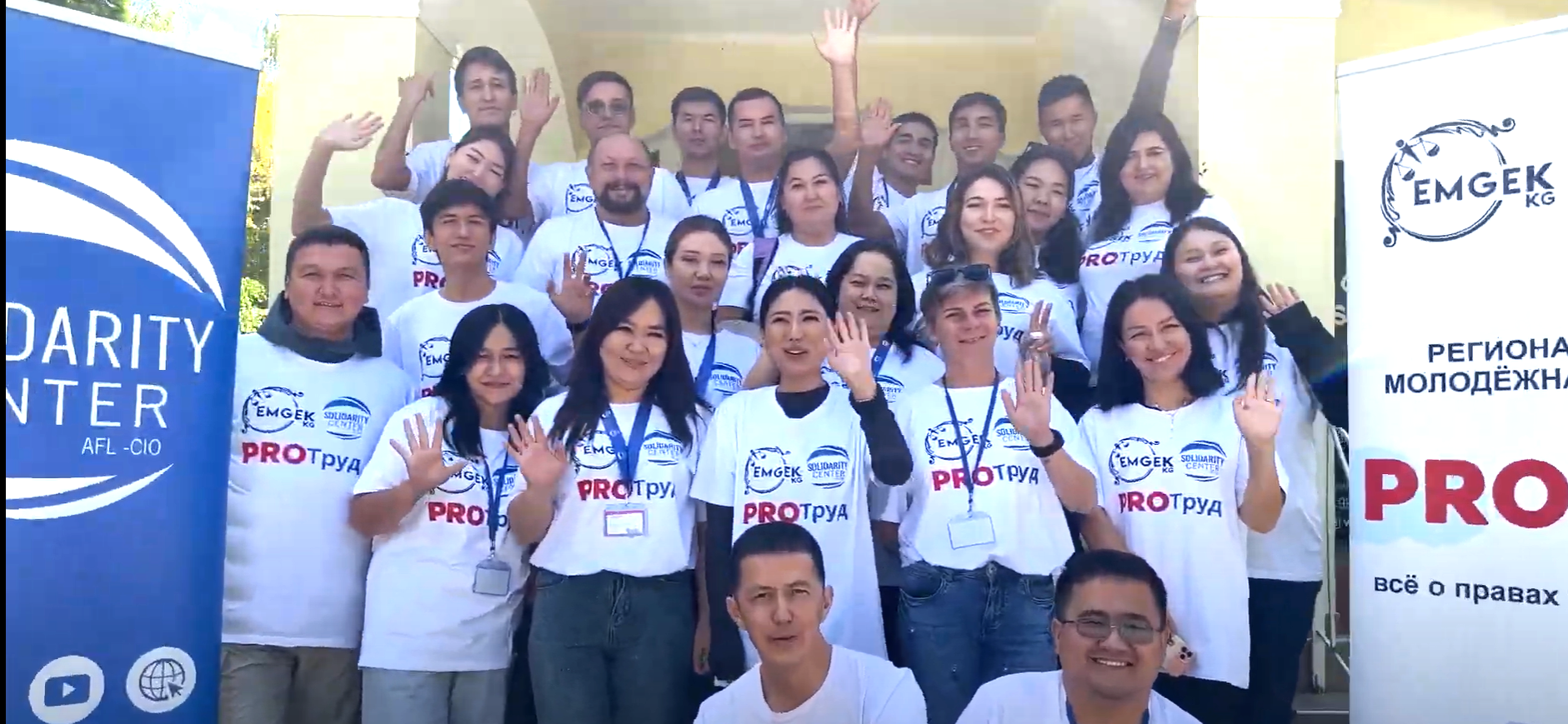
Participants from Kazakhstan, Kyrgyzstan and Uzbekistan took part in a regionwide leadership seminar to increase labor strategies for battling corruption. Credit: Solidarity Center
“We learned how to protect labor rights, how to fight [workplace] corruption,” Salamabekova Meerim, a member of the trade union of medical workers in Kyrgyzstan, said about a recent workshop. “These lessons give us valuable tools to improve our lives and strive for better conditions.”
In a recent three-day NED-funded workshop, 18 young leaders from Kazakhstan, Kyrgyzstan and Uzbekistan from areas such as health care and mining, engaged in interactive learning that combined professional input with participatory exercises, blending lectures with gamified elements, such as role-playing and interactive tools.
Participants said they plan to hold peer-to-peer training sessions on labor rights and workplace corruption in their countries, countries.
By creating a strong framework—expanding young workers’ ability to turn their ideas into action—the Solidarity Center continues its bottom-up, partnership approach, one that results in permanent, lasting change.
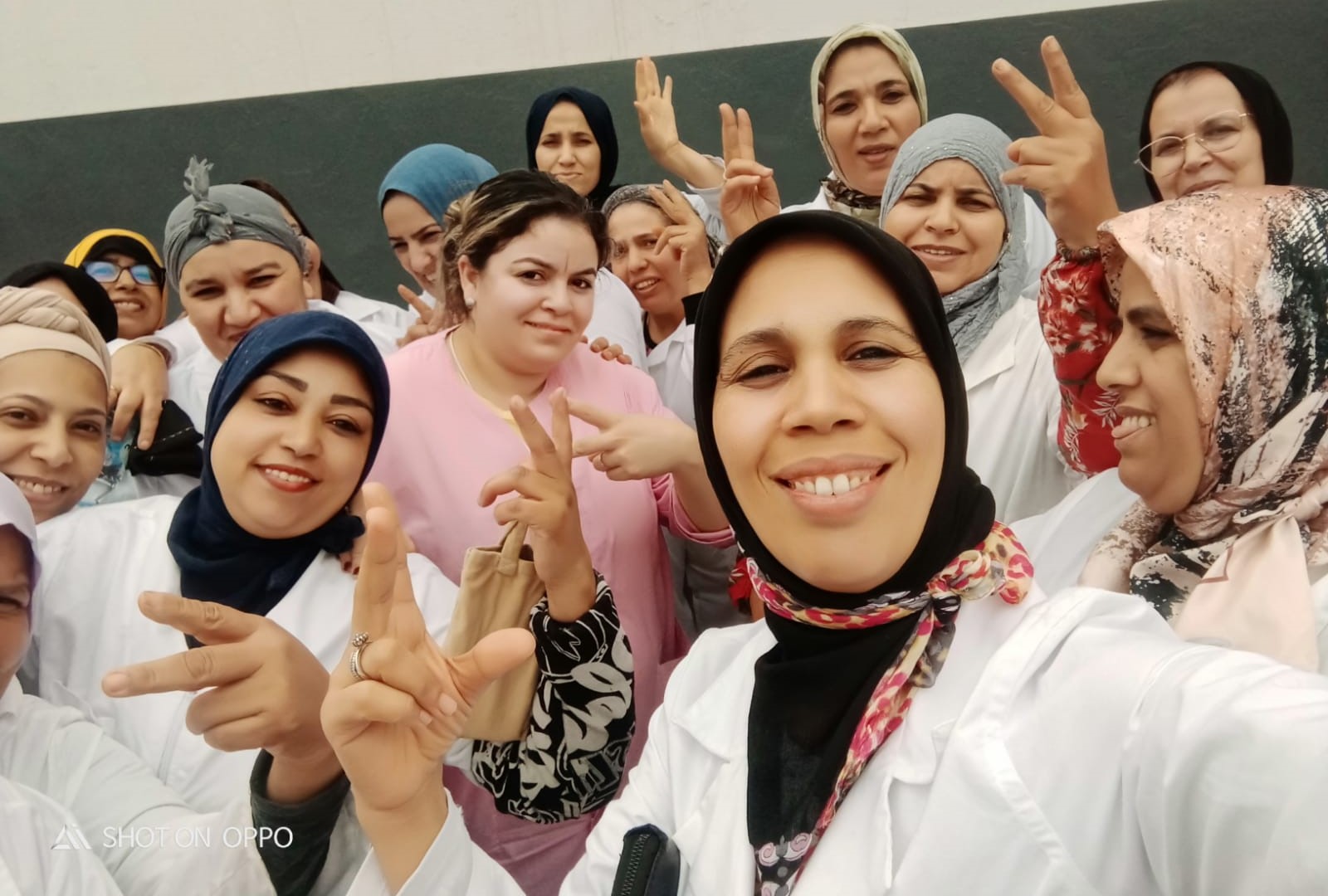
Nearly 2,000 workers at textile factories in Casablanca, Morocco, now can receive decent pay, health care protection and a voice on the job after joining UMT. Credit: Solidarity Center / Hicham Ahmaddouh
Morocco Textile Workers Win Dignity, Decent Work
For the nearly 2,000 workers at seven textile factories in Casablanca, Morocco, forming a union enabled them to receive decent pay, health care protection and a voice on the job. Joining together also meant achieving success when exercising democracy.
“We joined the union primarily to preserve our dignity, which some managers have trampled on,” said one worker, who voted for the union. (Names are not used to protect workers’ privacy.)
In November, the workers formed unions through the Moroccan Workers’ Union (UMT) and the federation of textile workers. Addressing unsafe and unhealthy working conditions was critical in the factories, where they are involved in leather production, sewing, dyeing and garment manufacturing.
They also sought fair wages—workers often were not paid, and received insufficient compensation when frequently required to work overtime—or engaged in fewer hours than specified by the government.
As in countries worldwide, the Solidarity Center teamed up with union partners, in addition to connecting directly with working people to best achieve worker rights. Solidarity Center’s NED-funded strategy not only enabled textile workers to practice their democratic rights to form unions and improve working conditions, but the efforts also are essential for expanding Solidarity Center’s efforts to broaden worker rights for all of society.
Assisting textile workers in forming unions moves forward their ability to achieve decent wages, safe workplaces and essential health care coverage—and advances their democratic rights to exercise freedom of association, organizing and more.
Without a union, said one worker, “we couldn’t find solutions to our issues or secure our legal rights, which the company has neglected for more than five years.
“We achieved dignity and the freedom to associate, which was previously denied.”
“The Solidarity Center played a critical role in the success of the campaign within the textile sector,” said Al-Arabi Hamouk, general secretary of the National Federation of Textile, Leather and Ready-Made Garment Workers. “The organizing team demonstrated the ability to strategize and address challenges.”
Ending Unpaid Labor, Boosting Job Safety & Health
Nurses and other medical professionals provide patients with crucial support—administering medications, monitoring vital signs, caring for people in hospital beds and more. But in the Maldives, nurses often worked between 40 and 60 hours of overtime each month—all with no pay. Through NED-funded Solidarity Center support and assistance, 9,000 nurses across the Maldives will now receive overtime pay in full when assigned extra hours of work during public holidays.
“This is a great win for the union workers. Our rights have been neglected for so long, but we have come so far through our work within the union,” says Shifana Ali, a medical laboratory assistant and active participant in the campaign.
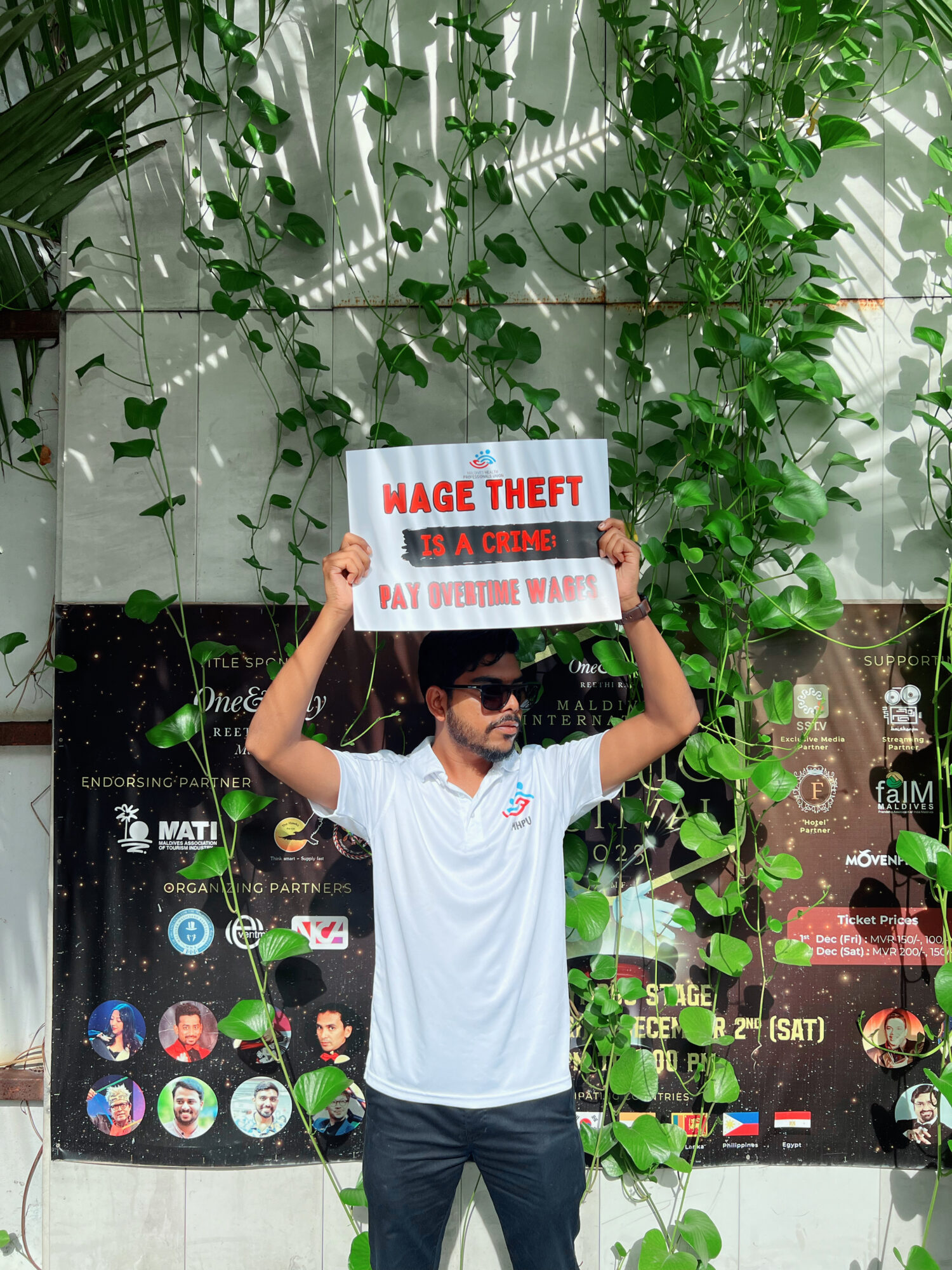
A health care worker holds a sign stating: “Wage theft is a crime–Pay overtime wages.” Credit: MHPU
The Solidarity Center collaborated with its partner, the Maldives Health Professionals Union (MHPU), on a robust campaign to advocate for legislative amendment, which was approved at the end of March and applies to all government healthcare workers.
In doing so, the Solidarity Center moved forward its core principle that when working people have the freedom and tools to organize, bargain and lead, they have the tools to build more just, inclusive and democratic societies. In facing the challenges confronting them, nurses in the Maldives could shape the policies and laws that truly make change for everyone by extending their voice and power through their union.
The Solidarity Center played a vital role in providing training and technical assistance to partner unions, including MHPU. The successful overtime campaign reflects the strategies the union gained, and its new focus facilitated workers in building grassroots, structured organizing efforts focused on strategies that educate and mobilize workers to build collective power.
“We want to ensure that all workers are safeguarded against unpaid forced labor, as it directly impacts both patient care and life beyond work of the individual,” says Fatimath Zimna, MHPU general secretary.
“The Solidarity Center was a huge partner in the campaign in passing two very crucial [pieces of] legislation,” Zimna says.
Achieving nurse overtime pay continued NED-funded Solidarity Center efforts with the Maldives Trade Union Congress (MTUC) and MHPU to improve job safety and health and the legally guaranteed democratic worker rights, such as the freedom to form unions and take part in peaceful protests.
The Solidarity Center worked closely with the unions throughout much of the decade-long campaign for job safety and health, providing mobilizing and technical training and assisting in the drafting process. Its passage goes a long way toward protecting workers’ rights, says Zimna, and highlights the importance of workers joining together in unions to improve working conditions that also benefit the community.
“It is important for workers to organize into unions and raise their voices collectively to protect workers’ interests to fully entertain the rights given by the two acts.”
Jul 15, 2025
In Liberia, union halls are not just places where workers gather to discuss wages. They are where democracy comes to life.
Daniel K. Weah Sr., Deputy Secretary General of the United Workers Union of Liberia (UWUL), knows this firsthand. For years, he watched as Liberian women in male-dominated industries—from mining and energy to transportation and agriculture—were overlooked, unheard, and unsafe at work.
That began to change when the Solidarity Center, with support from the U.S. Department of Labor’s Bureau of International Labor Affairs (ILAB) program, launched the “Elevating Women’s Participation in the Workplace” initiative across West Africa.
“The Solidarity Center ILAB/USDOL program was so beneficial to us,” Daniel said. “It was good for our union operations and had a positive impact on the lives of union members across West Africa.”
The program sparked something powerful. Study Circles gave women the space and tools to grow their leadership, and gave men the chance to confront and reject norms that perpetuate violence and harassment against women. In factories and fields, on rubber plantations and in union halls, something shifted.
“Women were being motivated to participate in workplace leadership contests, roles traditionally held by men in our country,” Daniel recalled. “This program helped us, as trade unionists—men and women—understand how to properly address safety issues at work, making our workplaces better for everyone.”
The results were real. In April 2025, Lydia Togba was elected National President of UWUL—a generational achievement made possible by years of investment in inclusive leadership development.
“The election of a female National President…was a direct result of these efforts—a life-changing and generational impact on our movement.”
Daniel says that by making space for everyone, especially women and young people, the union itself became stronger.
“Making sure everyone is involved in the labor movement, not just the same few people, has made our union more democratic, more creative and more powerful. When women bring their ideas, when young workers speak up, when leadership reflects all of us, we are better able to solve problems, to organize, to win,” he said. “For example, women can use their own experiences as women to help us better negotiate things like maternity leave or safety protections against harassment at work—and it makes all of us better for it.”
But then, Solidarity Center’s funding from the U.S. Department of Labor’s ILAB was cut. The ILAB program ended abruptly. And the momentum—the hard-earned gains—now hang in the balance.
“The cutting of funding…not only adds anxiety amongst the women workers, but it has created a setback for the ‘Study Circle’ activities, which were motivational,” Daniel said. “We pray that the Solidarity Center will be able to regain some support and funding for the resumption of these activities.”
The loss is not just felt at work. These programs created ripple effects throughout communities.
“The knowledge gained from the training has a lasting impact that extends beyond the workplace into the communities, as workers share their learnings with family members and friends,” Daniel said. “This is an example of how our unions truly help make life better for people, not just at work, but in the communities where we live. Losing programs like the ones the Solidarity Center provides is a horrible thing for West Africa and our world.”
Daniel’s leadership journey didn’t stop there. He also completed a two-phase training with the Global Labor Leadership Initiative (GLLI), run by the Solidarity Center and Cornell University’s School of Industrial and Labor Relations (ILR). The experience deepened his understanding of how democratic unions contribute to civic life and global solidarity.
“This GLLI program changed my world,” he said. “I understand so deeply now how so much of our work is connected—how what we do in our unions affects our lives in our communities, affects our world—and how we as worker leaders are connected all around the globe. Realizing the power of our collective voice and actions globally has made me a more confident, inclusive and strategic leader.”
Through GLLI and Solidarity Center support, Daniel built lasting relationships with unions like the United Steelworkers in the United States. Together, they now strategize across borders to hold multinational corporations accountable to labor rights in global supply chains—the same rights many companies publicly commit to but often fail to uphold.
“Sometimes we will be sitting across the table from companies, and they look stunned when they realize the information we have and the knowledge we have from organizing together as workers around the world,” he said. “This is exactly what they do as global capital, but they are surprised when we do it as workers.”
That, Daniel says, is why programs like GLLI matter—and why they are often threatened.
“This is the kind of power they don’t want us to have, workers organizing, speaking up, coming together across borders. That’s why we have to keep these programs going. If we want a real say in the decisions that affect our lives, not just at work but our whole lives—we need strong unions and strong leadership. That’s what real democracy means for us.”
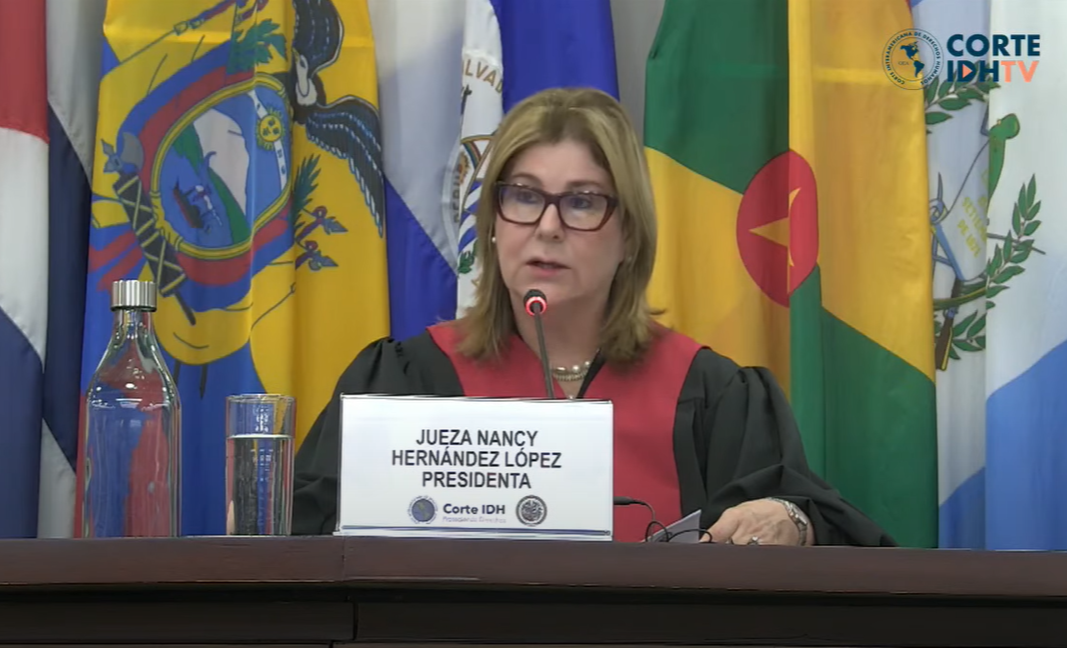
Jul 4, 2025
In a groundbreaking opinion with global implications for workers and labor rights, the Inter-American Court of Human Rights on July 3 affirmed that states have a legal obligation to protect human rights in the face of the climate emergency, including the rights of working people.
The court’s advisory opinion, requested by the governments of Chile and Colombia, marks the first time an international tribunal has directly linked the climate crisis to core labor rights and protections. It reinforces that climate change is not only an environmental challenge but also a human and workers’ rights issue.
The Solidarity Center’s International Lawyers Assisting Workers (ILAW) Network played a central role in elevating the labor movement’s voice in the process. ILAW’s legal brief, cited by the Court, highlighted how climate change disproportionately harms workers—especially agricultural workers, migrants, and people in the informal economy—and outlined the need for just transition policies rooted in consultation with unions.
“The recognition that governments must work with trade unions to develop and implement just transition strategies is a major step forward in international law,” said Jeffrey Vogt, Solidarity Center Rule of Law Director and ILAW Network co-founder. “The Court’s opinion makes clear that labor rights, including freedom of association, are essential to any climate response.”
Just Transition Is Not Optional
The Court held that all member states of the Organization of American States (OAS) are obligated to adopt strong measures that reduce climate risks and protect people from its harmful effects. Among its most significant findings:
- Workers and unions must be consulted in designing and implementing climate and labor transition policies.
- Governments have a duty to prevent and mitigate job-related health and safety risks from climate impacts, including heat exposure.
- States must proactively develop job creation strategies that promote sustainable development and protect livelihoods as industries evolve.
The Court cited ILAW’s argument that defending labor rights, including for the most vulnerable, is essential to achieving a truly just transition. This builds on longstanding international labor standards and aligns with International Labour Organization (ILO) guidelines.
According to ILO estimates, by 2030, productivity losses due to extreme heat could be equivalent to 80 million full-time jobs. Without stronger protections and planning, that number could soar even higher.
A Voice for Workers in Global Climate Law
The Inter-American Court received more than 260 amicus briefs from over 600 organizations and experts, but few focused squarely on the experience of working people. The ILAW Network’s submission ensured that the lived reality of workers—those most exposed to climate impacts—was at the center of the conversation.
ILAW also participated in the Court’s public hearings in Bridgetown, Barbados, where advocates emphasized how climate change is already disrupting jobs, threatening health, and exacerbating inequality for working people globally.
This ruling is expected to influence climate-related legal opinions and decisions around the world, including an anticipated opinion from the International Court of Justice. It sets a new standard for how governments must integrate labor rights and worker safety into their national climate strategies.
This ruling is also a clear reminder of how unions and worker organizations strengthen democracy. When workers have a voice—especially in legal and policy spaces where everyday people are often left out—they can help shape decisions that protect not only their own lives and jobs, but entire communities. It’s one more way labor movements play a vital role in making societies fairer, safer, and more accountable.
Learn More
Explore the ILAW Network’s recent report on climate justice and just transition laws to better understand the legal tools available to protect workers in the climate emergency.
Click here to learn more about our climate and worker rights programming.
The Solidarity Center and ILAW’s work on this case was generously funded by private donors.















